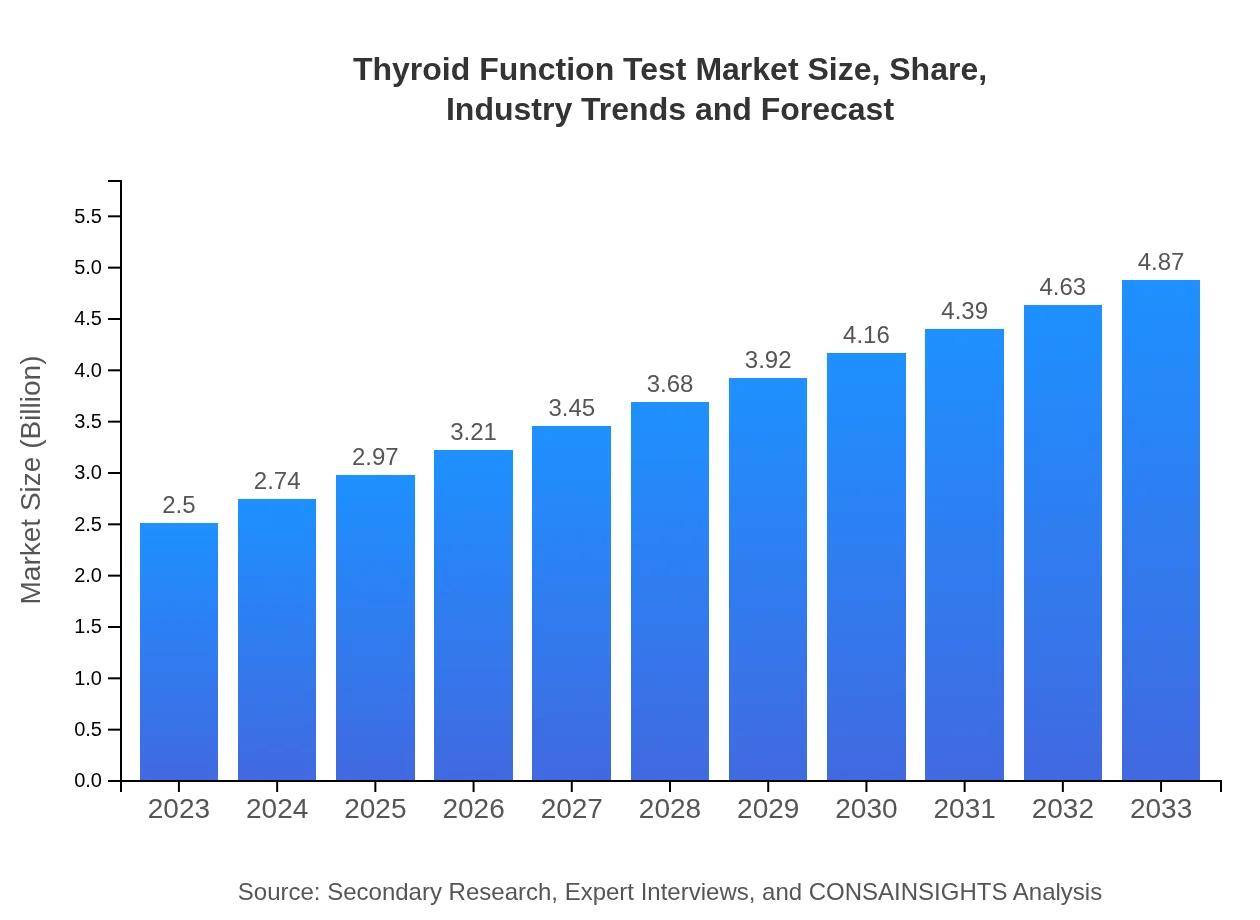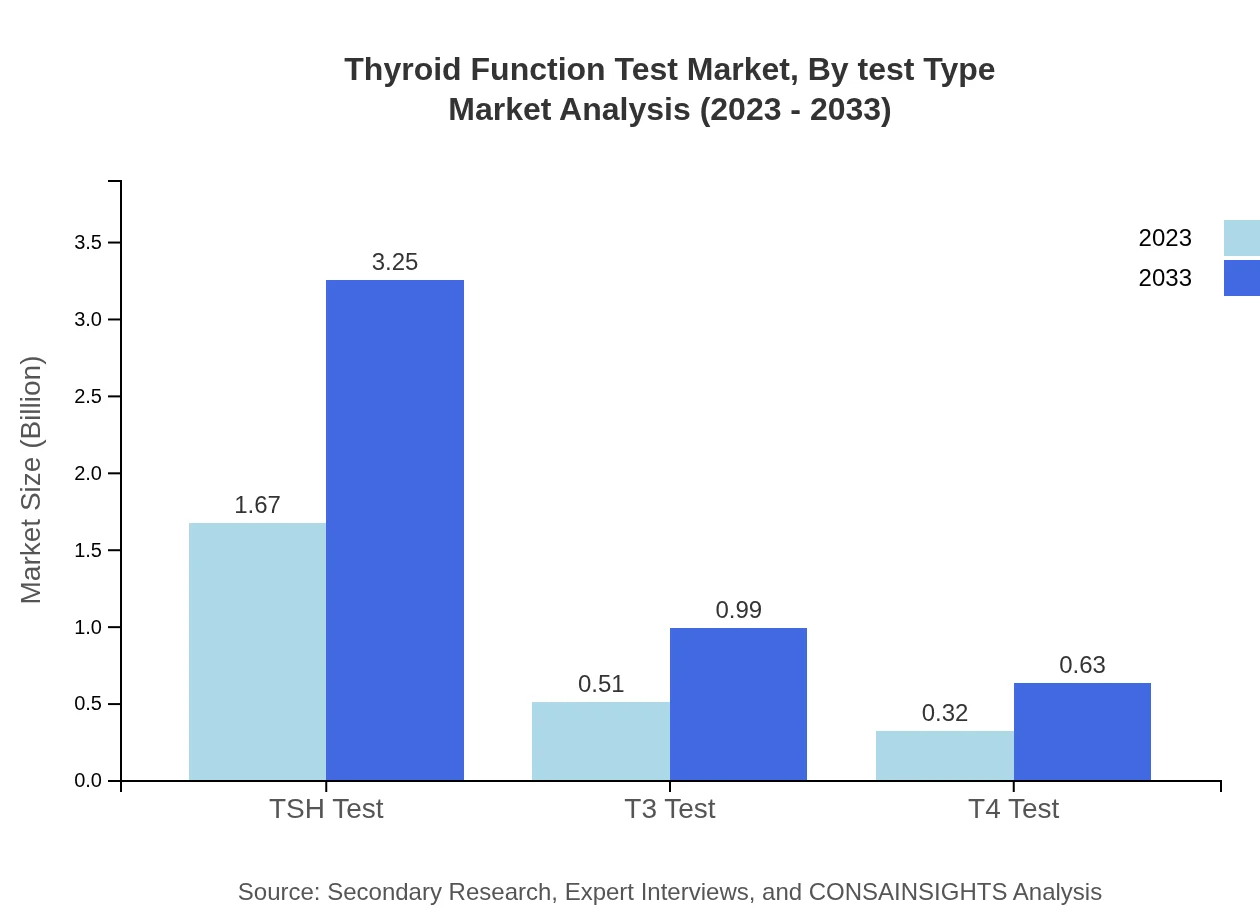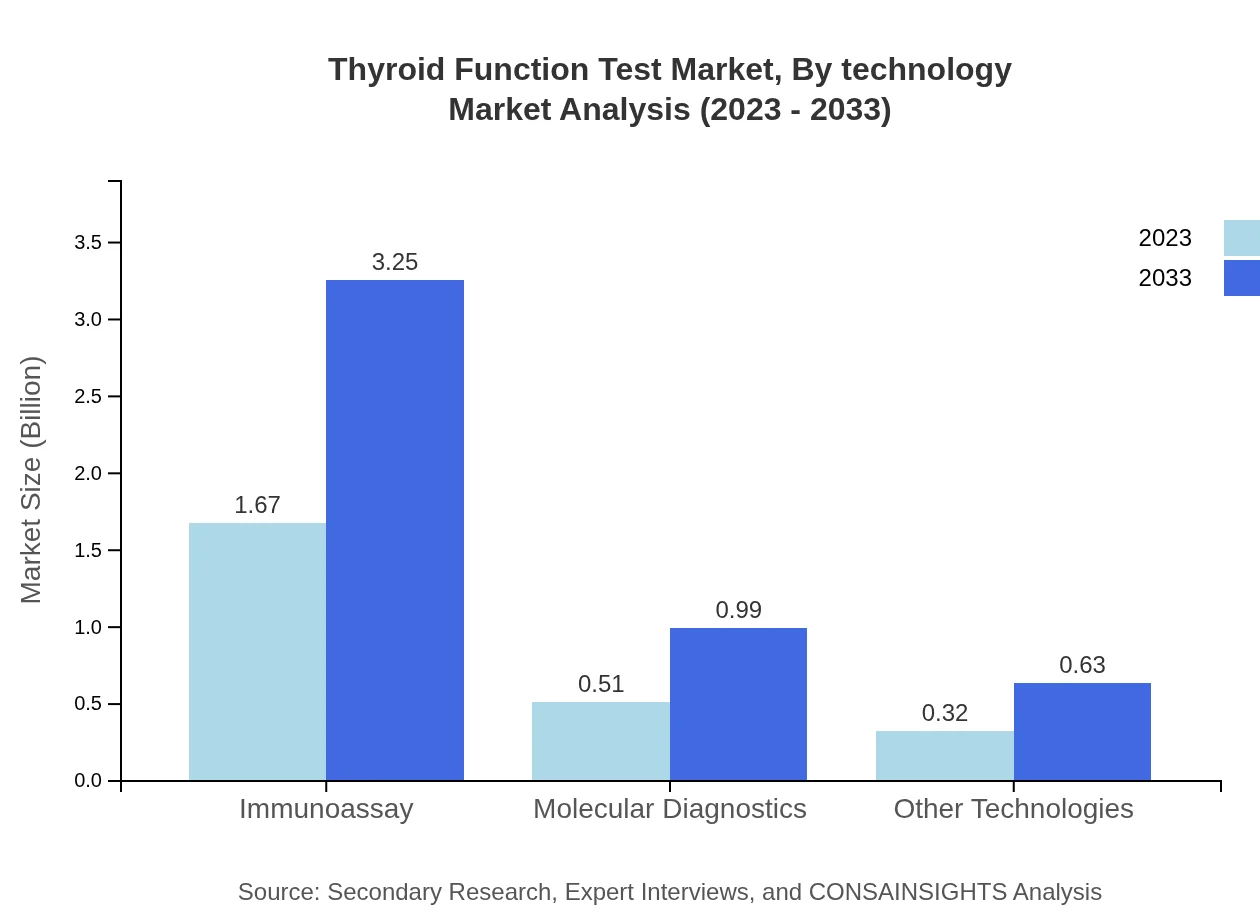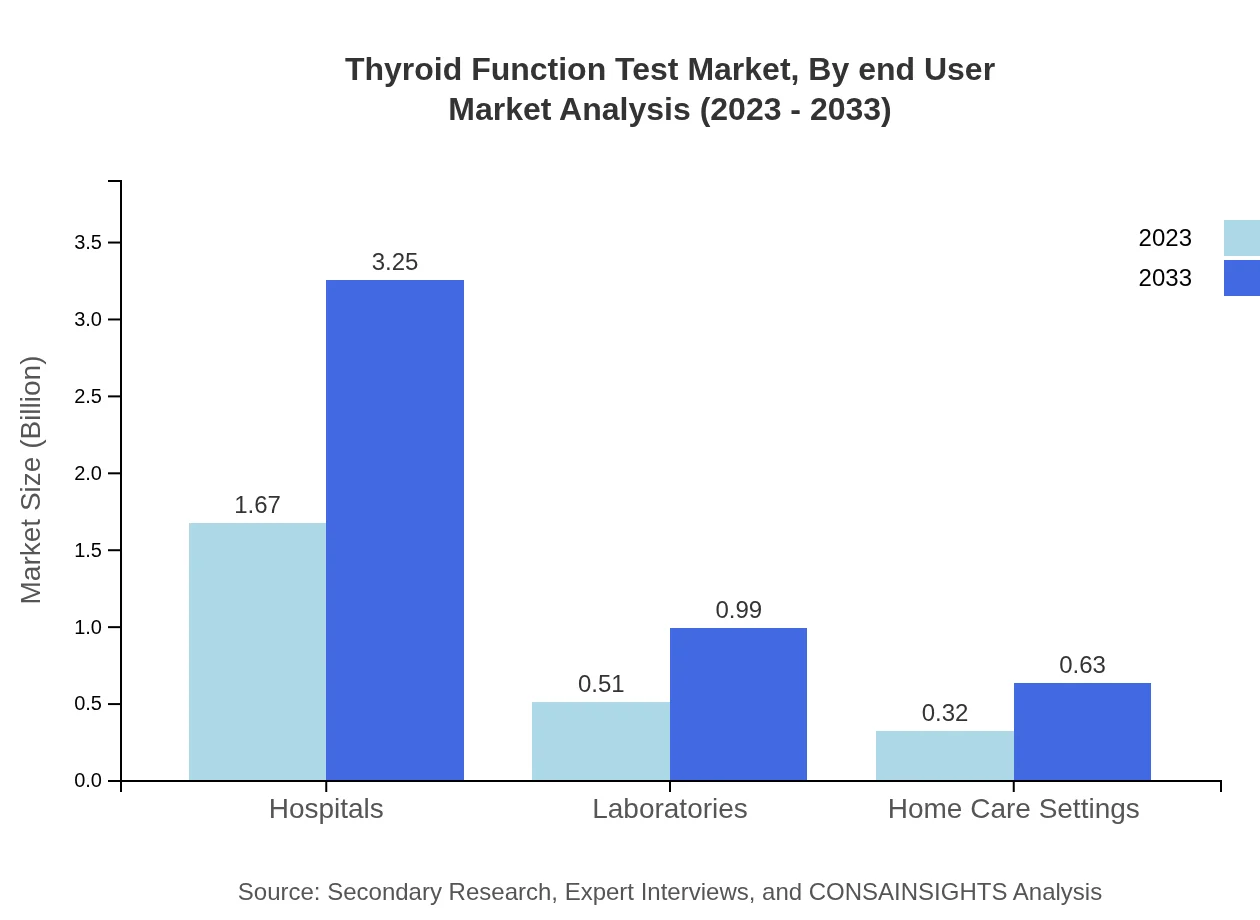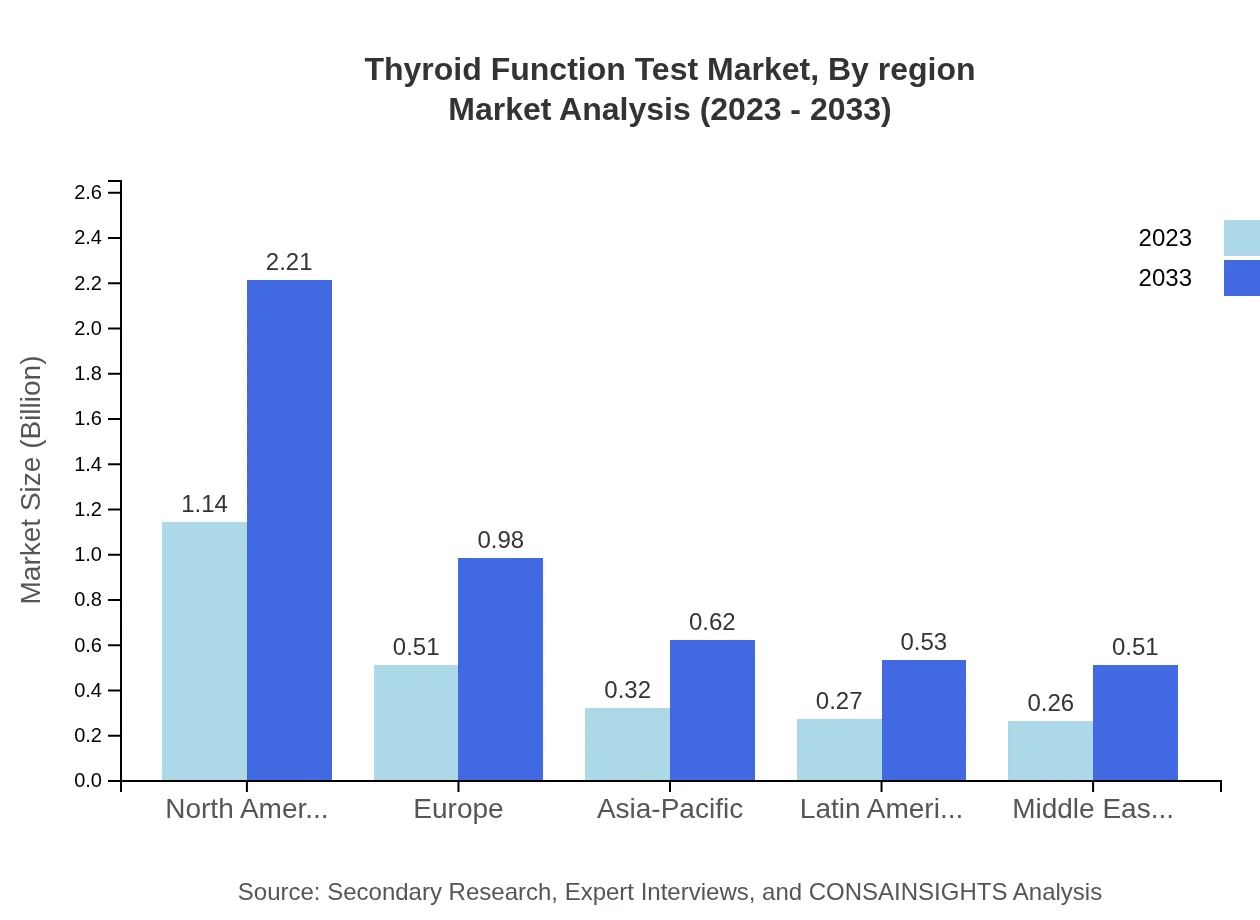Thyroid Function Test Market Report
Published Date: 31 January 2026 | Report Code: thyroid-function-test
Thyroid Function Test Market Size, Share, Industry Trends and Forecast to 2033
This report presents an in-depth analysis of the Thyroid Function Test market covering key insights from 2023 to 2033, including market size estimates, competitive landscape, and trends influencing the sector.
| Metric | Value |
|---|---|
| Study Period | 2023 - 2033 |
| 2023 Market Size | $2.50 Billion |
| CAGR (2023-2033) | 6.7% |
| 2033 Market Size | $4.87 Billion |
| Top Companies | Abbott Laboratories, Roche Diagnostics, Siemens Healthineers, Thermo Fisher Scientific, Mindray |
| Last Modified Date | 31 January 2026 |
Thyroid Function Test Market Overview
Customize Thyroid Function Test Market Report market research report
- ✔ Get in-depth analysis of Thyroid Function Test market size, growth, and forecasts.
- ✔ Understand Thyroid Function Test's regional dynamics and industry-specific trends.
- ✔ Identify potential applications, end-user demand, and growth segments in Thyroid Function Test
What is the Market Size & CAGR of Thyroid Function Test market in 2023?
Thyroid Function Test Industry Analysis
Thyroid Function Test Market Segmentation and Scope
Tell us your focus area and get a customized research report.
Thyroid Function Test Market Analysis Report by Region
Europe Thyroid Function Test Market Report:
The European Thyroid Function Test market is anticipated to increase from $0.92 billion in 2023 to $1.79 billion by 2033. Growing awareness about thyroid disorders and the push towards personalized medicine are significant factors driving this growth. The region is also witnessing technological advancements facilitating enhanced testing methods.Asia Pacific Thyroid Function Test Market Report:
The Asia Pacific region is expected to see significant growth in the Thyroid Function Test market, rising from $0.47 billion in 2023 to $0.92 billion by 2033. Factors driving this growth include increased healthcare spending, an expanding elderly population, and greater awareness of thyroid disorders. The rising number of hospitals and laboratories achieving diagnostic excellence is expected to further support market progress.North America Thyroid Function Test Market Report:
North America, commanding the largest share, shows a Thyroid Function Test market growth from $0.82 billion in 2023 to $1.59 billion by 2033. This region benefits from well-established healthcare facilities, advanced diagnostic technologies, and high healthcare expenditure. The increasing prevalence of thyroid disorders and ongoing research initiatives in diagnostics are propelling the market in this region.South America Thyroid Function Test Market Report:
In South America, the Thyroid Function Test market is projected to grow from $0.06 billion in 2023 to $0.11 billion by 2033. Increasing efforts to enhance healthcare infrastructure combined with rising awareness regarding thyroid health will stimulate market expansion. However, economic and regulatory hurdles remain challenges that potentially hinder rapid growth.Middle East & Africa Thyroid Function Test Market Report:
In the Middle East and Africa, the Thyroid Function Test market is expected to rise from $0.23 billion in 2023 to $0.45 billion by 2033. Improved access to healthcare, increased investments in health technologies, and rising awareness of thyroid health issues contribute to this positive trajectory.Tell us your focus area and get a customized research report.
Thyroid Function Test Market Analysis By Test Type
The major test types within the Thyroid Function Test market include TSH, T3, and T4 tests. The TSH test dominates, bolstering its position due to its widespread use in diagnosing thyroid dysfunction. The T3 and T4 tests follow closely, contributing to the overall market growth, especially in comprehensive diagnostic panels.
Thyroid Function Test Market Analysis By Technology
The Thyroid Function Test market by technology includes immunoassays, molecular diagnostics, and other methods. Immunoassays hold the largest market share due to their accuracy and efficiency in diagnostics, while molecular diagnostics are increasingly favored due to their specificity and rapid results, supporting their growth in the clinical setting.
Thyroid Function Test Market Analysis By End User
The market segments by end-user are hospitals, laboratories, and home care settings. Hospitals currently hold the largest share, recognized for their comprehensive services. Laboratories are also significant contributors due to their essential role in diagnostic processing. Home care testing is emerging, driven by patient preference for convenience and accuracy.
Thyroid Function Test Market Analysis By Region
This segment analysis aligns with the overall regional insights, reflecting similar trends and expectations based on demographic data, healthcare policies, and regional economic factors influencing the Thyroid Function Test market's growth trajectories.
Thyroid Function Test Market Trends and Future Forecast
Tell us your focus area and get a customized research report.
Global Market Leaders and Top Companies in Thyroid Function Test Industry
Abbott Laboratories:
A leading global healthcare company providing advanced diagnostics solutions, including thyroid function tests and innovative laboratory instruments.Roche Diagnostics:
Known for its effective diagnostic tests, Roche offers a comprehensive range of thyroid function tests that emphasize precision and reliability.Siemens Healthineers:
Specializing in medical technology, Siemens provides equipment and tools that enable accurate thyroid testing and enhance diagnostic workflows.Thermo Fisher Scientific:
A key player in biochemical test development, Thermo Fisher supplies tools and reagents crucial for the execution and reliability of thyroid function tests.Mindray:
Focused on diagnostic solutions, Mindray offers a user-friendly platform for tests, enhancing accessibility and efficiency in thyroid testing.We're grateful to work with incredible clients.









FAQs
What is the market size of thyroid function test?
The global thyroid function test market is currently valued at approximately $2.5 billion and is projected to grow at a CAGR of 6.7% from 2023 to 2033, reflecting an increasing demand for accurate diagnostic testing.
What are the key market players or companies in this thyroid function test industry?
Key players in the thyroid function test market include Abbott Laboratories, Thermo Fisher Scientific, Roche Diagnostics, Siemens Healthineers, and Quest Diagnostics, which significantly influence market dynamics through innovation and competitive offerings.
What are the primary factors driving the growth in the thyroid function test industry?
Growth in the thyroid function test market is driven by rising incidences of thyroid disorders, an increased focus on preventive healthcare, advancements in diagnostic technologies, and growing awareness regarding thyroid health among consumers.
Which region is the fastest Growing in the thyroid function test market?
The Asia-Pacific region is the fastest-growing market for thyroid function tests, with market size expected to reach $0.92 billion by 2033, driven by increasing healthcare expenditure and rising patient awareness in emerging economies.
Does ConsaInsights provide customized market report data for the thyroid function test industry?
Yes, ConsaInsights offers customized market report data tailored to specific needs within the thyroid function test industry, ensuring clients receive the most relevant and applicable insights for strategic decision-making.
What deliverables can I expect from this thyroid function test market research project?
Deliverables from the thyroid function test market research project include comprehensive market analysis reports, segmentation insights, competitive landscape assessments, and forecasts detailing market trends and opportunities over the specified period.
What are the market trends of thyroid function test?
Current trends in the thyroid function test market indicate a shift towards home-based testing solutions, increased use of automation in labs, and growing integration of AI in diagnostics to enhance accuracy and speed in test results.

